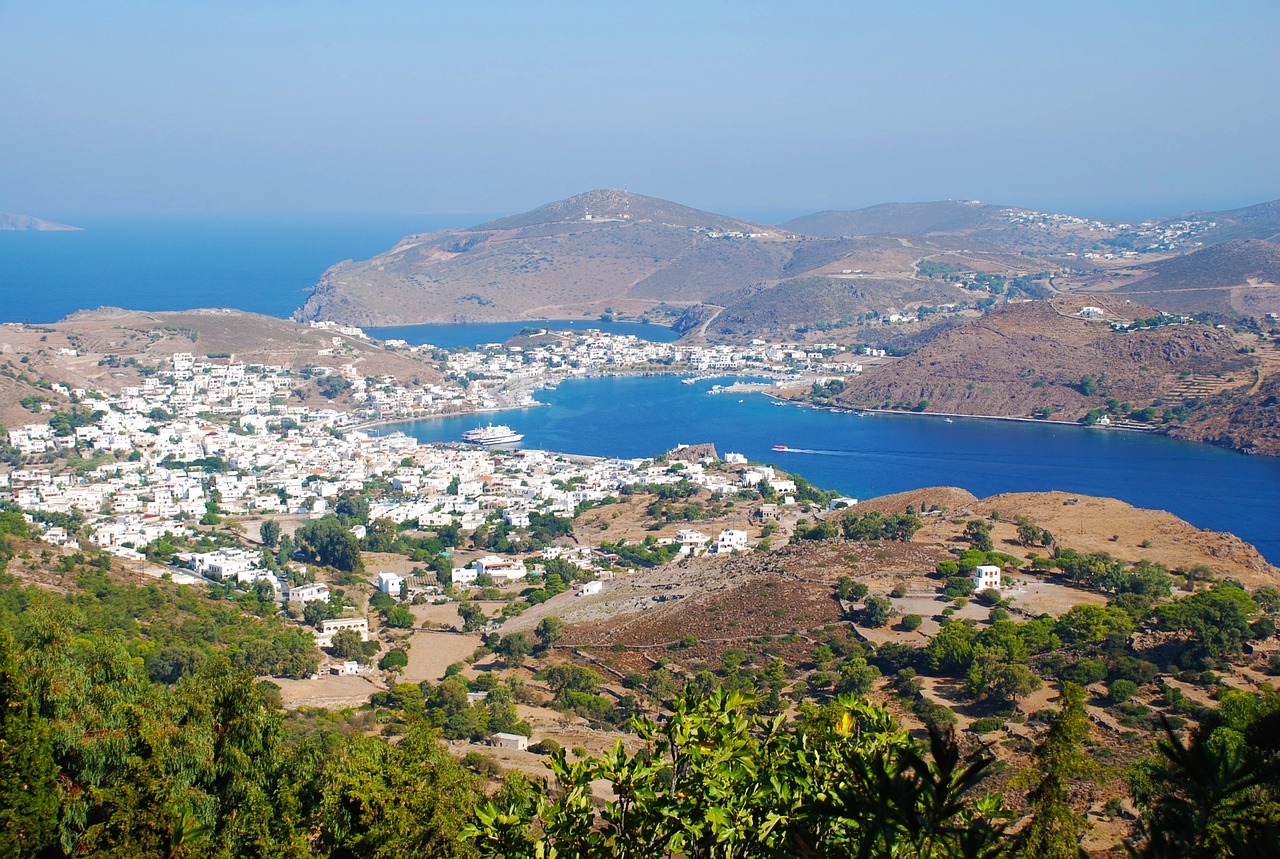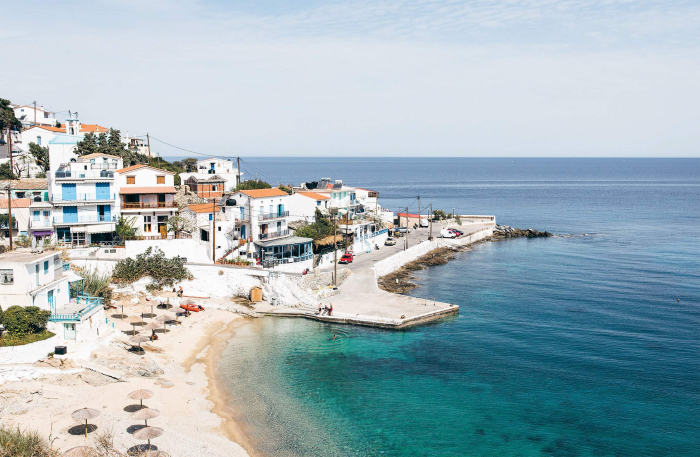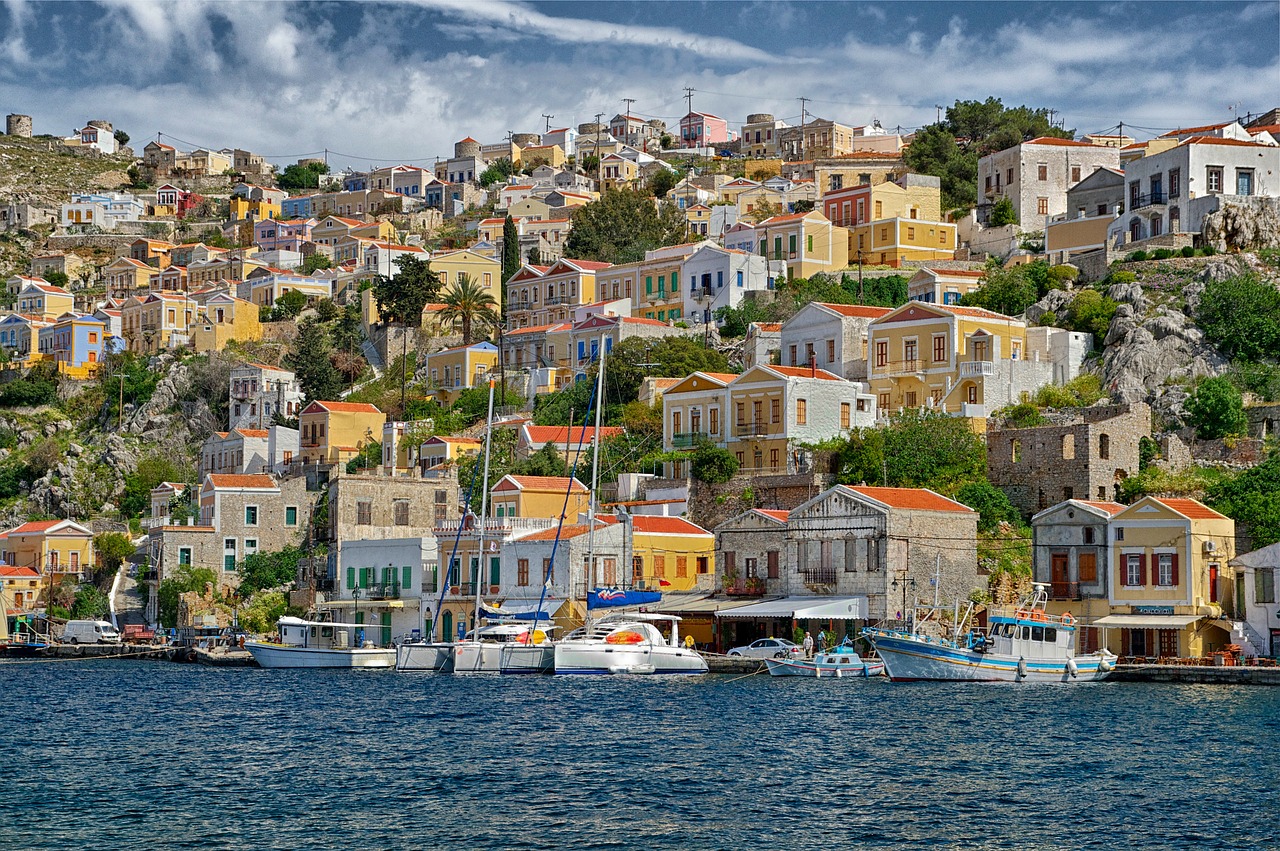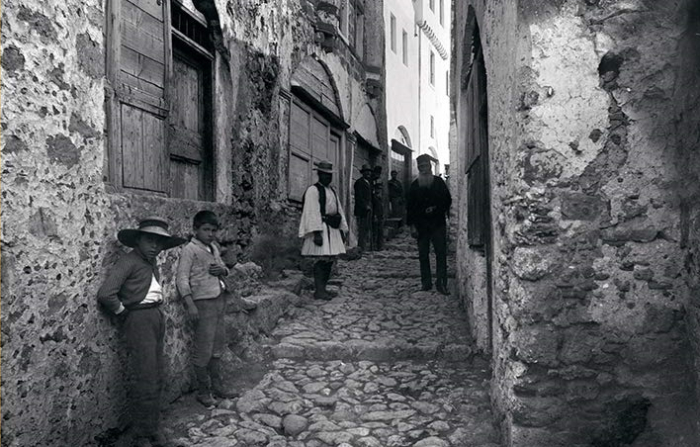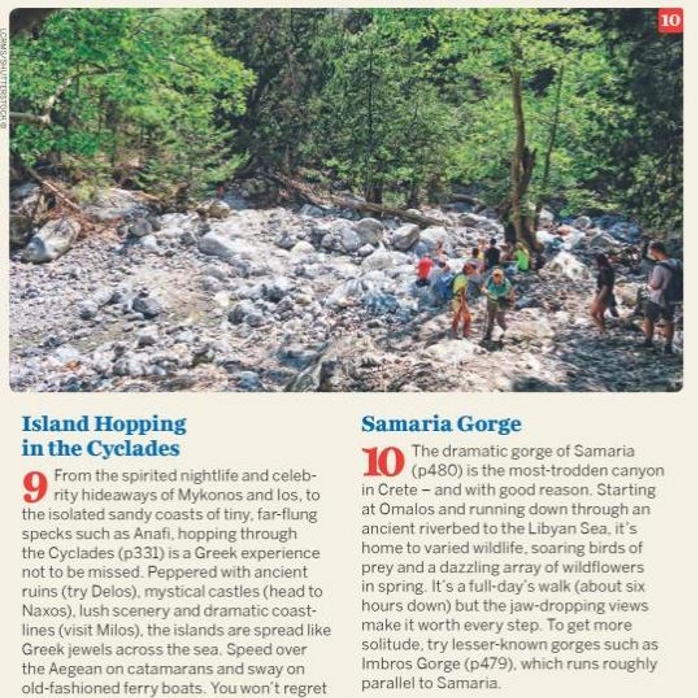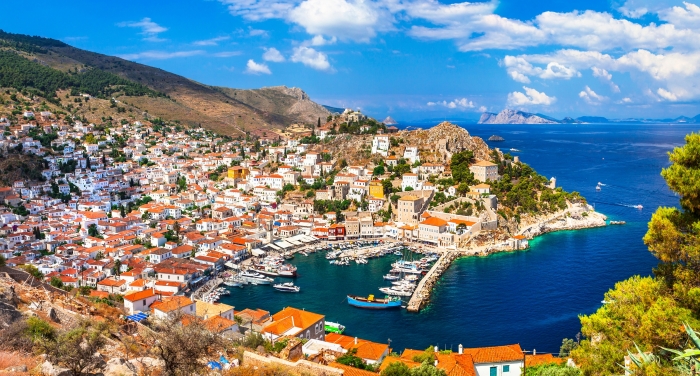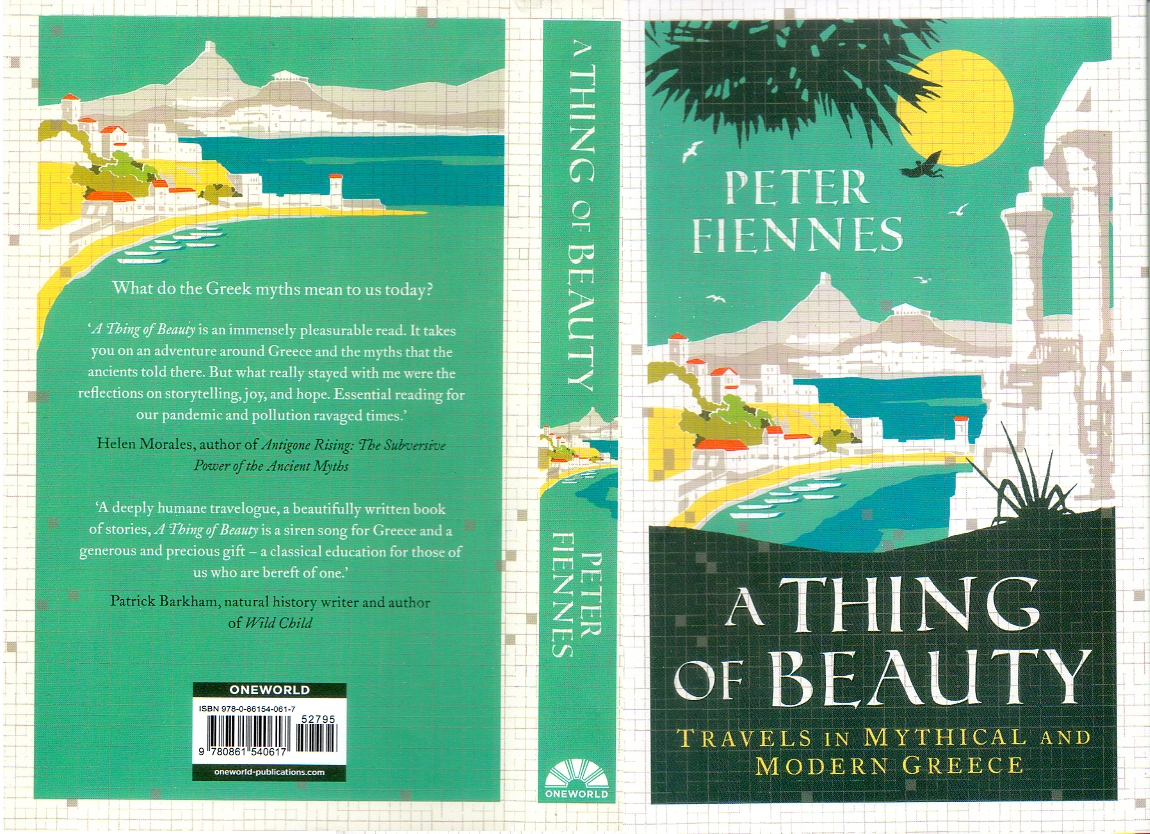- HOME
- Greece Book Reviews
- The Summer of My Greek Taverna
The Summer of My Greek Taverna
The Summer of My Greek Taverna by Tom Stone is a memoir of his time on the Greek island of Patmos in the Dodecanese, running a restaurant.
The Sumer of My Greek Taverna is a little gem of Greek travel writing. The American author shows that he is a true Grecophile by giving up his career on New York’s Broadway to go for his dream of living on a Greek island for a while. Of course, as in so many cases, the ‘while’ turns into something much longer: 22 years!
Moving to Patmos
The story that’s at the heart of the book only takes place several years after the author first moves to Patmos in the Dodecanese, where his dream is to write his novel. While there, though, he meets and falls in love with Danielle, a French artist. The two marry and go to live in Rethymnon on Crete.
Here he still wants to write, she wants to paint, but as by now they have two children, they have to bring in some money somehow. When The Summer of My Greek Taverna begins, the author is teaching English while his wife is painting Greek icons to sell in the tourist shops.
Fateful Phone Call
This is the situation when Stone receives a phone call from someone he knew back on Patmos, who runs a taverna in the little village where the couple lived. The taverna and the village are given fictitious names, and it’s obvious why when you get into the book.
The caller is Theologos, and he has a proposition for Tom Stone. Would he like to run Theologos’s taverna for the summer, as he says he’s getting a bit old for it and thought Tom, a keen amateur chef who has also worked as a waiter in Rethymnon, might be interested.
The first instinct is that it’s a crazy idea, a big upheaval to take their two children to Patmos to do something Tom has never done before, not knowing what the outcome might be. Tom does some maths and works out that they could make enough during the summer to enable them to work at writing and painting for the rest of the year, and beyond. Danielle takes some convincing, but eventually supports her husband in what he wants to do.
Back to Patmos
So, the couple return to Patmos and move into the apartment they first rented on the island, before they bought a house there, which they eventually sold. Part of the proceeds of the house go towards paying Theologos for the right to run the restaurant for one season, and share the profits.
Theologos has agreed to be the buyer of supplies, but leaves the author to run the restaurant and the kitchen. Right at the start there’s a misunderstanding, when the author offers to work an extra two days before his contract stipulates, only to find that Theologos won’t split the tidy profits as the author volunteered to do the work and the contract hadn’t yet come into play.
The Harsh Truth
Over the course of the summer in his Greek taverna, the author discovers the harsh realities of his new life. For one, running the taverna takes up more hours than he ever imagined. He finds himself flopping onto the bed next to his wife at 4am some nights, without even the energy to get undressed. Another discovery is that his relationship with the islanders who had become friends in the years he and his wife lived on Patmos, is now different. To some he has become a rival, and everyone now regards him as a temporary Greek, and a businessman, to be treated with caution and even cheated if they get the opportunity.
It’s the many different aspects of life on the island, and the fact that it’s very well-written, that make the book such a joy to read, It’s in turns funny, sad, touching, and a very human story. You’re rooting for him to succeed, you worry about his relationship with his wife when he hardly sees her for day after day, and you’re fascinated by the insights into what it’s like to run a taverna in the Greek islands at the height of the tourist season in August.
The Summer of my Greek Taverna Recipes
It would be unfair to reveal how the book ends. At the back, however, is the menu of the taverna (called in the book The Beautiful Helen), and almost 40 pages of recipes. These include Greek staples, like tzatziki, stifado, and meatballs, and others that the author added to the menu to give it more of an international feel, such as chili con carne and curried chicken.
You’ll also find a recipe for his moussaka, which he says is the best he’s ever found, from a chef he worked for in Rethymnon, and some recipes of his own devising, including tzatziki omelette and chicken retsina.
The Verdict
All in all this is a delightful read, which you won’t want to put down, and a real addition to the classic books about Greece, alongside Lawrence Durrell and Patrick Leigh Fermor. Perhaps not quite in their league in terms of literary quality, but certainly every bit as readable. It’s enough to say that it was first published in 2002, and it’s still in print some twenty years later.
You can buy The Summer of my Greek Taverna on Amazon.
Latest Posts
-
The Lesser-Known Traditions of Greek Easter
Step off the beaten path this spring and discover the enchanting — and often surprising — Easter traditions found across Greece. -
Easter in the Mystical Castle of Monemvasia
In the castle town of Monemvasia, with its dramatic medieval backdrop and sea views, Easter is a deeply spiritual and atmospheric experience. -
Sifnos: Greece’s Hidden Culinary Star on the Rise
Sifnos, a Cycladic island, is gaining fame for its rich culinary heritage, especially the beloved melopita honey-cheese tart. -
Easter in Leonidio: A Tapestry of Light, Culture and Cliffs
In Leonidio, Easter comes alive with handmade hot air balloons in the sky and lanterns made from bitter oranges in the streets. -
April 9 Strike in Greece to Impact Public Transport, Ferries and Air Travel
Transportation and travel across Greece will face disruptions on Wednesday, April 9, as public transport, ferry and aviation workers join a nationwide strike called by Greek labor unions. -
Ancient Theater of Lefkada Brought Fully to Light Following Systematic Excavation
The Greek Culture Ministry has announced that the first ancient theater ever identified in the Ionian Islands has recently been brought fully to light on Lefkada, revealing an impressive monument that… -
Seven Greek Traditions Recognized as Intangible Cultural Heritage
From traditional barrel-making to age-old folk dances, seven new entries on Greece’s National Inventory preserve the country’s living heritage for future generations. -
Greek Air Traffic Controllers to Hold 24-hour Strike, Disrupting Flights on April 9
The Hellenic Air Traffic Controllers Union have announced a 24-hour strike for Wednesday, April 9, in response to the protest called by the Civil Servants’ Confederation (ADEDY). The strike is being h… -
Ten Best Budget Hotels on Santorini
Greece Travel Secrets picks the ten best budget hotels on Santorini, some with caldera views, some near beaches and some close to the heart of Fira. -
No Ferries in Greece on April 9 as Seamen Join Nationwide Strike
The Pan-Hellenic Seamen’s Federation (PNO) has announced its participation in the 24-hour strike called by the General Confederation of Greek Labor (GSEE) on Wednesday, April 9. The strike, which will…



